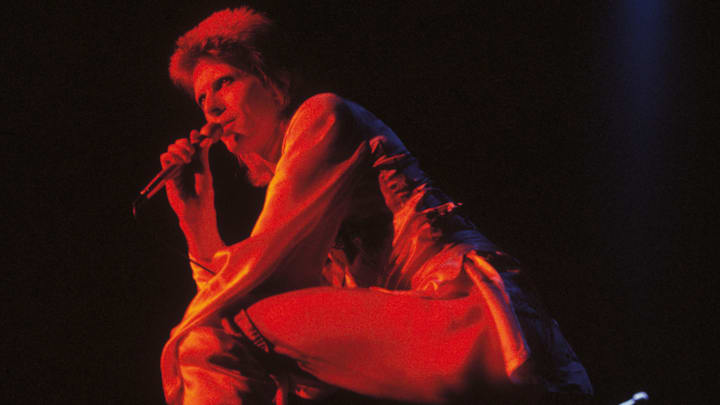Here are 10 more classic albums that redefined rock 'n' roll music. Fittingly, they represent different eras and sub-genres, each contributing to the evolution and diversification of the genre as a whole.
1. The Who - Who's Next (1971)
This album by The Who is a rock masterpiece that blends powerful vocals and intricate instrumentals, featuring iconic tracks like "Won't Get Fooled Again," "Baba O'Riley" and "Behind Blue Eyes." Known for Roger Daltrey's powerful vocals, John Entwistle's captivating bass, Keith Moon's energetic drumming, the innovative use of synthesizers and Townshend's dynamic guitar work, the album captures the band's energy and rebellious spirit. The thematic depth explores disillusionment with the '60s counterculture, showcased in Townsend's ambitious rock opera concept.
"Who's Next" remains a timeless classic, influencing generations with its fusion of hard rock, introspective lyrics, and groundbreaking sound, solidifying its place as one of the greatest rock albums of all time that contributed to the development of hard rock and arena rock.
2. Led Zeppelin - IV (1971)
Sometimes called "The Biggest Band in the World," part of that reputation stems from this album released in 1971, considered a timeless rock masterpiece. At a time when social conservative critics blasted hard rock by saying "that ain't music," Led Zeppelin went on and did their thing anyway. The album seamlessly blends blues, folk, and hard rock, showcasing the band's musical prowess.
Many of the songs from it are also included on the album and film titled "The Song Remains the Same." Iconic tracks like "Stairway to Heaven," "Rock and Roll," "When the Levee Breaks," and "Black Dog" highlight Robert Plant's powerful vocals, Jimmy Page's intricate guitar work, John Paul Jones' versatile bass, mandolin, rcorder, and keyboard skills, and John Bonham's thunderous drumming. "IV" is a classic that has stood the test of time, influencing generations of musicians and leaving an indelible mark on the rock music landscape, and solidified their place in rock history with epic compositions and innovative musical techniques.
3. Pink Floyd - The Dark Side of the Moon (1973)
The Dark Side of the Moon by Pink Floyd is a groundbreaking concept album that explores themes of human existence, mental illness, and societal pressures. With its seamless blend of progressive rock, psychedelic sounds, and innovative studio techniques, the album takes listeners on a sonic journey. Each track flows into the next, creating a cohesive experience.
Iconic for its prism album cover and timeless tracks like "Money" and "Time," the album has become a cultural touchstone, celebrated for its musical innovation and emotional depth, solidifying Pink Floyd's legacy as one of the greatest rock bands of all time. This concept album is a masterpiece that pushed the boundaries of rock with its progressive and experimental sound.
It also managed to have some of the essence of prog rock while sounding more like "classic rock" than "classical rock" — something many 1970s groups lumped into the prog rock label can't say of themselves. It's not that there's anything inherently wrong with classically-tinged rock, but sometimes playing for the song has its place (or, in this place, playing for the album, as this album truly is better when heard as a whole).
4. David Bowie - The Rise and Fall of Ziggy Stardust and the Spiders from Mars (1972)
David Bowie's iconic concept album The Rise and Fall of Ziggy Stardust and the Spiders from Mars tells the story of Ziggy Stardust, an androgynous, extraterrestrial rock star who rises to fame as Earth's savior but succumbs to excess and self-destruction. Were people ready for that back in 1972? Some weren't, and still wouldn't be, but David Bowie went ahead and it and did it anyway.
The album weaves glam rock, proto-punk, art-rock, sci-fi, and social commentary, featuring Bowie's alter ego Ziggy as a symbol of artistic rebellion and societal challenges. With hits like "Moonage Daydream," "Ziggy Stardust," "Starman" and "Suffragette City," it's a timeless exploration of identity, fame, and the fragility of the human experience, solidifying Bowie's legacy as a musical and cultural trailblazer. Bowie's concept album introduced the world to Ziggy Stardust and showcased his ability to reinvent both himself and the rock genre.
[NOTE: The song "Space Oddity" is actually not on this album, though that track (and certainly others) could seem like a fitting companion piece to "Ziggy Stardust."]
5. The Clash - London Calling (1979)
This album is a seminal punk rock album that seamlessly blends punk, reggae, ska, and rockabilly. Fueled by urgent, socially conscious lyrics, it captures the disillusionment and unrest of the late 1970s. The title track, with its iconic bassline, almost serves as a rallying cry. Songs like "Spanish Bombs" and "Clampdown" showcase the band's versatility, while "Rudie Can't Fail" and "Train in Vain" exude infectious energy.
The album's eclectic sound and rebellious spirit have left an enduring impact, making it a timeless classic that transcends genres and generations. This is a punk rock classic that expanded the genre's boundaries by incorporating elements of reggae, ska, and rockabilly, complicating the very question of what punk rock can be, while appealing to an undeniably large audience.
